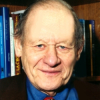Paul Kurtz

Paul Kurtz
Paul Kurtzwas a prominent American skeptic and secular humanist. He has been called "the father of secular humanism". He was Professor Emeritus of Philosophy at the State University of New York at Buffalo, having previously also taught at Vassar, Trinity, and Union colleges, and the New School for Social Research...
best game last passed today
we passed better today than we did in our best game last year.
becoming call crisis cumulative last people starting
Over the last 14 months, we are starting to see a cumulative effect, what I would call a crisis in confidence. People are becoming more uncertain.
government problem solve
The government doesn't have to solve everyone's problem here.
best couple familiar few help last matter players plays suppose whoever win
We'll be a little more familiar with it than some of the other teams. Hopefully, that'll help out. We've been there the last couple years. A few years ago, we didn't win it. If we have any kind of edge, I suppose that would be it, but it's still a matter of whoever plays the best and has the best players will win it.
gone
We thought we were prepared, ... I think we could have gone all the way.
fair held pressure team
We were under a little more pressure tonight. Springfield is a pretty fair team but we held up well.
leaving atheism deceit
The theist can only find meaning by leaving this life for a transcendental world beyond the grave. The human world as he finds it is empty of 'ultimate purpose' and hence meaningless. Theism thus is an attempt to escape from the human condition; it is a pathetic deceit.
other-worlds vision atheism
We need to be skeptical of utopianists who offer unreliable totalistic visions of other worlds and strive to take us there. We need some ideals, but we also need to protect ourselves from the miscalculations and misadventures of visionaries.
intelligent government people
We have never denied that it is possible, indeed probable, that other forms of life, even intelligent life, exist in the universe. But this is different from the belief that we are now being visited by extraterrestrial beings in spacecraft, that they are abducting people, and the there is a vast government cover-up.
religious principles silent
We cannot remain silent when someone of the Pope's stature and credibility confuses religious principles for science
would-be virtue claims
No one is infallible, and no one can claim a monopoly on truth or virtue. It would be contradictory for skepticism to seek to translate itself into a new faith.
religion atheism
No diety will save us; we must save ourselves.
ignorance caring keys
Three key humanist virtues are courage, cognition, and caring - not dependence, ignorance, or insensitivity to the needs of others.
religious philosophy roots
In contemporary society secular humanism has been singled out by critics and proponents alike as a position sharply distinguishable from any religious formulation. Religious fundamentalists in the United States have waged a campaign against secular humanism, claiming that it is a rival "religion" and seeking to root it out from American public life. Secular humanism is avowedly non-religious. It is a eupraxsophy (good practical wisdom), which draws its basic principles and ethical values from science, ethics, and philosophy.